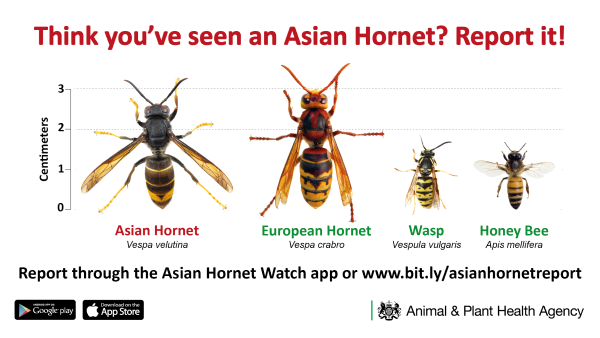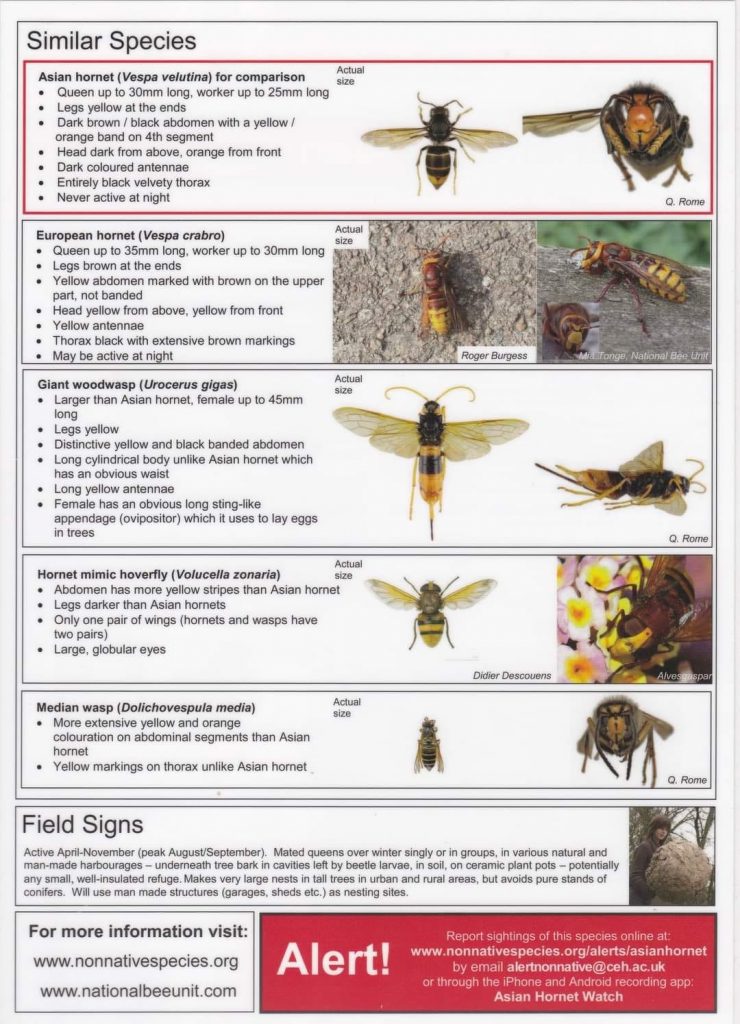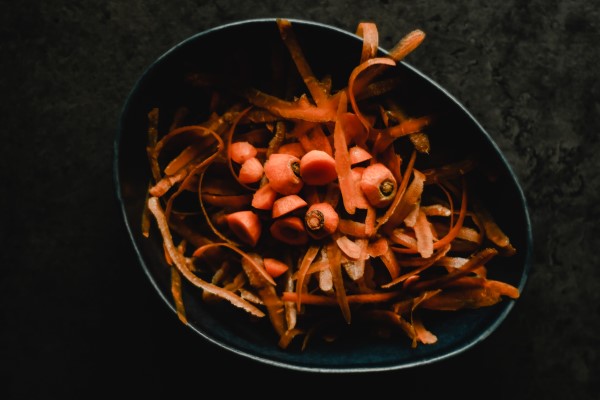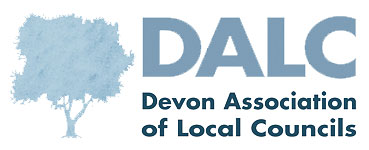Asian hornet awareness in Devon

Help spread awareness of the Asian hornet!
Devon could be vulnerable to the spread of Asian hornets this year, with the vast majority of reported sightings and nests in the south of the country, especially coastal counties.
As you may already be aware, Asian hornets pose a significant risk to our native wildlife due to the way in which they prey on honey bees and other pollinators, which could in turn have a devastating impact on our wider ecosystem. Furthermore, these insects become aggressive when they perceive a threat to their nest, which can be built low to the ground in hedgerows, or in the eaves of buildings – meaning they can easily be disturbed by passers-by. This is therefore not only an issue of environmental concern, but one of public health too – especially during the summer season when residents and visitors to the county will be enjoying outdoor spaces.
The British Beekeepers’ Association are working hard to make sure as many people as possible are made aware of the potential presence of Asian hornets this summer, how to identify them and how to report them, to aid Defra’s efforts to eradicate the species before it becomes established.
There is a very proactive group of beekeepers in Devon who are keen to get the word out about the Asian hornet threat and who have offered to give talks and presentations in their own time – please do let the British Beekeepers Association know if you’d be interested in this.
In the meantime, there is some information below, including posters and ID sheets, which councils could share in their communities to help raise awareness. This includes some some safety information for outdoor workers and contractors operating in spaces where Asian hornets may be active.
More information
Non-native species alert poster
British Beekeepers Association Safety Guidance for outdoor workers
Posters and leaflets to share



Food Waste Collection Campaign 2023

The Food Waste Collection campaign aims to highlight how easy it is for residents to make the most of their food waste collection service.
A recent analysis of black bin waste across the county showed that many households are still putting food waste in their black bin.
Instead, residents are being encouraged to use their food waste containers to put this waste in, so it can be collected weekly, alongside other waste and recycling services. It is then processed at an anaerobic digestion facility in Devon. The material is broken down in a series of sealed tanks to produce methane, a gas used to generate electricity, and digestate, a nutrient rich fertiliser used by local farmers.
In areas with authority-wide food waste collections, if every household made use of their food waste container it would not only help to create energy and fertiliser but would also save more than £ 2.8 million on disposal costs. Keeping food waste out of the black bin also helps to save space in the bin for non-recyclable waste and prevent odours and pests especially during the warmer summer months.
Any bag can be used to line your food waste container including reusing bags such as bread or cereal bags. This helps to keep the caddy clean and makes it easy to transfer the waste from an indoor container to the kerbside container.
A range of items can be put in the food waste container:
- Breads and pastries
- Egg shells
- Dairy
- Meat and bones/plate scrapings
- Coffee grounds and teabags
- Fish
- Fruit and vegetables
- Pasta and rice
- Uneaten pet food and cut flowers
Residents in areas with food waste collections are encouraged to pledge one or two simple actions they can take – and be in with a chance of winning one of five blenders. Closing date is midnight on 26th November.
Not all areas of Devon have food waste collections, but if this is a service in your community, then the council can help by sharing this message with their residents.
Elections and Coronation guidance in our Knowledge Bank

We have updated our Elections guidance and created an Elections FAQs to help guide you through the upcoming council elections. We’ve also created a Coronation webpage to gather ideas and advice for celebrating the Coronation!
Devon has local council elections coming up in May 2023, which can be a bewildering process for anyone new to councils and even those who have gone through the election cycle before. In addition to our Preparing for Elections training, we also have updated our elections guidance in our Knowledge Bank to help you understand what might be coming up.
We’ve also created an Elections FAQs, covering just some of the questions we get asked about the elections, so you can find a quick answer to any query you may have. As always, if you can’t find an answer on our website or need any further help, then please don’t hesitate to contact our Advice Service.
Putting yourself forward for election can also be a confusing time, so we’ve created this Elections Guide for Candidates for any potential election candidates this year whether you’re a returning councillor or completely new to local councils – please feel free to share the guide in your communities as you promote the elections!
Coronation 2023
This year, the Coronation being held on Saturday 6 May, is also having an impact on local election timelines. We have created a dedicated webpage with guidance on the plans laid out by the palace, some suggestions for organising different events, and a breakdown of what various councils in Devon are doing to celebrate. We hope this will be a useful resource for your council, and will build a picture of how Devon is celebrating.
If you haven’t yet told us how your council is celebrating the coronation, then please do take a moment to complete this short survey; it’s really useful to know what councils are planning!
Being a Good Councillor Full Course (Exeter)
*New for 2023*
This full day Being a Good Councillor course will help new councillors gain essential knowledge to support them in their role.

Recommended for:
Councillors wanting a comprehensive introduction to the essentials of being a good councillor.
Course Overview:
This face-to-face course will provide the opportunity for councillors to gain essential knowledge and understanding, whilst also meeting other councillors. The course will cover:
- roles and responsibilities of councils, councillors and the clerk
- council powers, the duties of the local council and the precept
- local council meetings and the role councillors have to play
- the council in the community and how to increase your engagement
This course will be delivered by Elise Callaghan.
Lunch and refreshments will be provided.
A copy of the Good Councillor’s Guide and all supporting resources will be provided to delegates on the day.
Other sessions available:
- Being a Good Councillor Full Course (South Devon), The Watermark, Ivybridge, June 15.
- Being a Good Councillor Full Course (Mid Devon), Best Western Tiverton Hotel, Tiverton, June 20.
- Being a Good Councillor Full Course (West Devon), Okehampton Business Centre, Okehampton, June 27
- Being a Good Councillor Full Course (North Devon), Caddsdown Business Centre, Bideford, 6 July
- Being a Good Councillor Full Course (East Devon), The Beehive, Honiton, 18 July
Government energy help for local councils

Energy help – the government have released a support package for all commercial energy users, including local councils. Read the guidance below from our partners, Clear Utility Solutions.
Firstly, we are incredibly pleased to report the support announced will provide energy help to all businesses regardless of size and sector with only a few basic criteria that must be met to qualify.
Due to the more complex nature of the commercial market the scheme will deliver a reduction on the wholesale price your supplier pays for the energy they supply to your business and this will then be translated into a reduction on the gas and electricity unit rates you see on your bill. The wholesale reductions have yet to be confirmed but the government has indicated that it will be £211 per megawatt hour or 21.1 pence per kWh for electricity and £75 or 7.5 pence per kWh for gas and these reductions will be applied by your supplier automatically. This is obviously fantastic news but it is important to understand these reductions apply to the wholesale element of a bill only and that suppliers will still need to add in their non commodity and other costs, as these additional costs vary from supplier to supplier it is just as important as ever to ensure you are on the right tariff. Non commodity costs have traditionally been around 10 pence per kWh for electricity and 2 pence for gas although they have risen over the last 12 months; at these rates we expect the help for businesses to be roughly equal to that being offered to domestic customers at around 34 pence per unit for electricity and 10 pence for gas. It is important to note, the exact rates will still vary from customer to customer unlike the domestic price cap.
Crucially, for customers on deemed, variable or out of contract tariffs, there is a limit to the discount you can expect to receive and the government has indicated this will be £405 per megawatt hour or 40.5 pence per kWh. If this does become the government’s final position then it is clear that with some such tariffs in excess of 100 pence per unit right now, the lion’s share of the help will be directed to those firms that have fixed their tariffs and we would advise any businesses on variable tariffs to look to secure a fixed deal as soon as possible. Further to this, such customers will still be exposed to any further wholesale increases.
To qualify for support the government has so far indicated that your contract must have started on or after the first of April 2022 provided that the wholesale element of the price the customer is paying is above the £211 level mentioned above. Initially the help will last for six months and will be applied to all bills from October the first, in addition any contract agreed after this date will be subject to the same help and will be revied in line with all other contracts. After the initial 6 months it is likely that further help will only be provided for the most vulnerable sectors, details have not been confirmed but early indications are that this will likely be for schools, hospitals and the care sector amongst others.
As a council if you are on either an out of contract tariff or variable tariff you will not receive the bulk of the benefits laid out, if you are unsure feel free to lean on us through our council energy scheme.

Read more about our partnership with Clear Utility Solutions and how they can help you.
A new website to help support Ukrainian refugees

Team Devon has launched a new website to help support Ukrainian refugees, with all the latest guidance and information.
Devon’s local authorities are supporting local residents who want to provide sanctuary to the Ukrainian refugees who have been forced to flee their homes. The new website now hosts the latest guidance and information as it becomes available.
Team Devon, including the Devon Association of Local Councils, pledged support to Ukraine and condemned Russia’s actions when it first invaded. The authorities are now giving particular support to families in Devon whose relatives in Ukraine are fleeing the conflict, as well as to households who volunteer to accommodate refugees.
The councils’ support of Ukraine follows their previous commitment, alongside health and voluntary sector partners and local communities, to help Syrian families and those fleeing conflict in Afghanistan.
Devon County Council is receiving the latest information from the government on the sponsors who have registered, and DBS checks on the sponsor families are being carried out, and Devon’s district authorities are using a common approach to assess each sponsor’s accommodation, which will help better assess any potential safeguarding risks.
Cllr John Hart, Leader of Devon County Council and Chair of the Team Devon partnership, says: “We are deeply concerned for those desperate people escaping conflict in Ukraine in huge numbers. We agreed that we have a duty to do what we can in Devon to support families fleeing Ukraine to join their family members here in the UK”
More information
All our guidance about how councils can help Ukraine, along with a briefing from NALC on the situation, can be found here.

